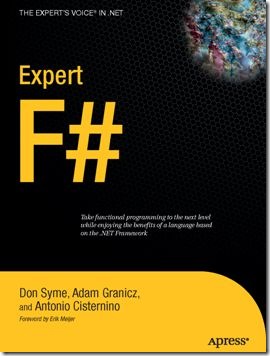Yesterday after reading the post YAPES: Problem Five at Dustin Campbell's site Did it with .NET, I was motivated to download the F# compiler bits. I've been keeping track of the news related to this new programming language but still hadn't felt a strong desire to play with it. There are so many new technologies emerging that you sometimes don't know where to focus your attention. Read the post The "Driving Force" pattern--part 1 of N so that you get a glimpse of what I'm expressing here.
This time I couldn't resist and so I'm really going to study this new language. Why have I decided to do so? It's because F# is a simple yet powerful new programming language that let's you express your thinking process in a more convenient way. By looking at the solutions presented in Dustin's posts you can have a taste of the power of F#.
F# is based on principles of functional programming although it's a mix of the different flavors of programming paradigms. That's because it targets .NET Framework. This way it is a multi-paradigm programming language with concepts of imperative and object-oriented programming disciplines.

The language is being developed at Microsoft Research. The folks behind the language plans to ship it with the next version of Visual Studio according to Somasegar's post F# - A Functional Programming Language. In the near future F# will be a real citizen of the .NET family of programming languages.
To me it's a completely new experience. I'm already familiarized with the new language extensions of C# like generics, lambda expressions and anonymous functions that bring to C# some of the concepts initially developed and implemented in functional programming languages. The ones mentioned here are a few language constructs if compared to the whole gamma of new functional language constructs that I must learn. There are plenty of them that I haven't seen in practice before. I'm really excited about what I'll learn on the next days and months.
OK, after a brief story it's time to show how you can start playing around with F# too.
Download F#
Go to the F# download page and get the .msi or .zip package. You can use Windows or Linux (Mono) to develop F# programs.
The package brings the F# compiler and a F# project template and debugger to be used within Visual Studio. Yes, although F# is new it has already gotten into Visual Studio. You get a lot of cool features using VS integrated development environment. The only drawback is that you need a paid full featured version of Visual Studio. Visual Studio Express editions aren't good to go. Check why in this thread about F# with Visual Studio Express.
I searched the internet and found a solution in the case you don't have a paid version of Visual Studio and want to use the VS IDE to get type checking and debugger warnings. You can follow the instructions of the post Do it yourself: Visual F# Express 2008. Basically you'll download a Visual Studio IDE that accepts add-ins but this IDE doesn't include the other .NET language as C# and VB.NET. I didn't try it because the download is big (316 MB) if you take into account that I still use a dial-up connection.
Final notes
One of the most interesting things of working in the technology arena is the velocity in which things are developed and shipped to the market. It appears that all the research done on the 70s are becoming real products today. This is because in the past there wasn't the opportunity of breaking barriers like we have today as getting in touch with people from anywhere in the world. We didn't have access to top technologies ten years ago. After the internet everything is more democratic and that's what makes the technology field one of the best to work on. You have the possibility of spreading to the world your new discoveries and they get to reality much faster. If you haven't read Somasegar's post I linked above, do so and you'll see what I mean.
References
F# site at Microsoft Research
http://research.microsoft.com/fsharp/fsharp.aspx
Don Syme's WebLog on F# and Other Research Projects - The guy behind the curtains
http://blogs.msdn.com/dsyme
Chris Smith's completely unique view on F#, more F#, and maybe other stuff
http://blogs.msdn.com/chrsmith
Brian's random thoughts about writing code for .NET
http://lorgonblog.spaces.live.com/
Jomo Fisher -- Sharp Things
http://blogs.msdn.com/jomo_fishe
LukeH's WebLog
http://blogs.msdn.com/lukeh
Books
Expert F# by Don Syme, Adam Granicz and Antonio Cisternino
Foundations of F# by Robert Pickering




